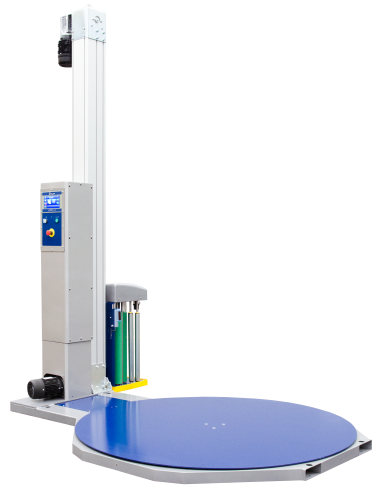stretch wrapper: CST 203
“Easy to pass” system to film stretch
Visual and audio alerts
Touch screen panel with 8 programs
There are different types of stretch wrappers: the turntable wrapper, arm wrapper, ring wrapper, robot wrapper and the horizontal wrapper. Each type of wrapper has its own specific characteristics.
Which type is most suitable for you depends, amongst other things, on what is being packaged, what the dimensions are, the amount of pallets per day and how heavy the load is. There are even more factors that determine the purchase of the right stretch wrapper.
Choosing the right pallet wrapper is complex and requires experience. We would naturally like to advise you on this. Contact us for no-obligation advice.
Please find an overview of our stretch wrappers below.
Do you want to receive more information? Please fill out the form below!
Which type is most suitable for you depends, amongst other things, on what is being packaged, what the dimensions are, the amount of pallets per day and how heavy the load is. There are even more factors that determine the purchase of the right stretch wrapper.
Choosing the right pallet wrapper is complex and requires experience. We would naturally like to advise you on this. Contact us for no-obligation advice.
Please find an overview of our stretch wrappers below.
Do you want to receive more information? Please fill out the form below!

Pallet wrapping is a technique in which a thin layer of plastic (film) is wrapped around a pallet or product. This can be done by hand or with a stretch wrapper. Various words are used for film wrapping, such as stretch wrapping and pallet wrapping, but they all mean the same thing.
With wrapping, products are bundled, secured and / or protected against, for example, sliding or falling over. In addition, a well-wrapped pallet also ensures that your cargo is well protected during transport and storage.
The purpose of stretch wrapping is to transport products from A to B properly and undamaged. This at the lowest possible (total) costs.
Wrapping is an inexpensive and simple way to secure loads. It is suitable for both uniform and irregular loading. Other advantages of pallet wrapping are:
Layers of thin plastic film are ‘stretched’ around the load by hand or using a palletwrapper. In this way, the wrapping film provides stabilization and protection.
There are different types of palletwrappers: the turntable wrapper, the arm wrapping machine, the ring wrapper, the robot wrapper and the horizontal or orbital pallet wrapper. Each type of stretch wrapper has its specific properties. Click here for an overview of our palletwrappers.
A good wrapping is as tight as possible around the load, without damaging the product. In addition, the stability is good, there is a connection to the pallet, there is no ‘film-string’, it looks neat and customer-friendly and at the lowest packaging costs per packaging unit. That is a good wrapping.
A good “wrap” result is achieved by carefully aligning different elements:
When selecting the best pallet wrapper, it is important that you know why you pack your pallets; you want your goods to arrive at the (final) destination in the same condition as they left your warehouse. And of course at the lowest possible cost.
You can then determine which type of film wrapping machine suits you best. Click here to receive the whitepaper with the 10 most important questions when purchasing a stretch wrapper.
Do you already have a pallet wrapper? Then it may be wise to take a closer look at the settings. It often happens that the correct wrapping film is not used or that not all possibilities of a machine are used. As a result, it is possible that your costs per pallet are too high, the load is not stable or that the environment is burdened unnecessarily.
Based on an expert analysis, we are happy to give you film wrapping advice.
Would you like tailor-made wrapping advice? Then do not hesitate to contact us!